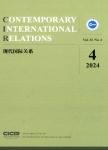Recent Political Developments in India and Their Effects
Recent Political Developments in India and Their Effects作者机构:the Institute of South Asian Southeast Asian and Oceania the Foreign Language School of China Communication University
出 版 物:《Contemporary International Relations》 (现代国际关系(英文版))
年 卷 期:2017年第27卷第4期
页 面:72-88页
学科分类:03[法学] 0302[法学-政治学] 030206[法学-国际政治]
主 题:India Narendra Modi Bharatiya Janata Party Hindu nationalism (Hindutva)
摘 要:In March 2017, Narendra Modi led his Bharatiya Janata Party(BJP) to victory in state elections, among which he gained parliamentary election of Uttar Pradesh(state in northern India), known as the weather vane of Indian elections. Back in 2014, the BJP had already won a simple majority in Lok Sabha(the lower house of parliament), bringing an end to more than 30 years of coalition government. Now, the BJP is exhibiting stronger presence as a one-party-rule at both federal and local levels, with no counter-balance from the Indian National Congress, local parties, or left wing parties now or in the foreseeable future. This increases the likelihood of Modi s re-election as prime minister in 2019. Obviously,Indian political development is characterized by complexity, accidental factors and intrinsic logic, which will definitely exert great influence on the future of India.



